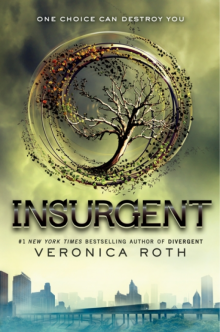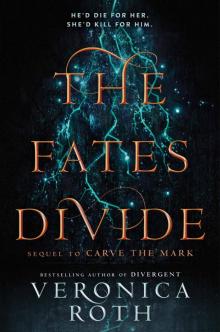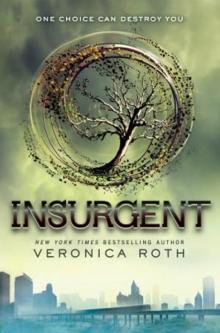- Home
- Veronica Roth
The End and Other Beginnings Page 16
The End and Other Beginnings Read online
Page 16
Do not look away, he thought as her eyes bored into his. Her eyes were the blue-white of early morning. His own were the opposite, so dark they almost looked black, in low light. His father’s eyes. Soulful, she called them sometimes, as if it was an insult.
“This is what we fear to admit,” she said, and dusted his face with spit, so forcefully did she whisper. “Transformation will destroy you. It will unmake you.”
She moved her bloody hands to his head, gripping his skull and yanking him close to her face.
“And here is the true horror,” she said. “You must let it.”
Otho’s uniform itched at the back of his neck, but he didn’t lift his hand to scratch. No sudden movements, that was the rule. He was CG Class 7, which meant guards weren’t supposed to touch him, for their own safety, in case the currentgift suppressor around his wrist malfunctioned. So instead he got two escorts from the mess instead of one—two sets of eyes to watch every little twitch of his fingers.
He didn’t know why he had been summoned, but in ACYR—the Assembly Center for Youth Rehabilitation—there was rarely anything good at the other end of a summons. If it wasn’t punishment that awaited him wherever he was going—and there was always a chance of that, as trouble came for everyone, every now and then—it was news. A death in the family was the most likely variety.
Otho didn’t have much family left.
He didn’t ask the guards flanking him. He didn’t scratch his neck. He didn’t look around at the empty cell block. He just listened to the squeak of the guards’ shoes on the floor—a shiny material, with some spring in it, a Pithar invention—and walked.
They passed through another set of doors, then another cell block, before making it to the visitation rooms. Otho had been to the big one before, to speak to his uncle Auly and his brother, Catho, but he had only ever gone to a private room to speak to his attorney, and Tyzo’s next visit was not scheduled for half a season at least, so he was surprised when the guard on his right grunted “Right here” next to one.
Tyzo sat at the white table within, dressed in a lumpy beige sweater, his glasses askew on his nose. He was a nice enough man, a fellow Zoldan, but Otho had never called him anything but “sir.”
Tyzo smiled at him when he walked in. Otho waited for the door to close behind him before sitting across from his lawyer at the table. He felt garish in his prison uniform, which was a vibrant green, with a yellow stripe around the chest and back that declared his CG Class 7 status. Everything else in the room was muted: gray walls, white furniture, Tyzo’s sweater and warm brown skin.
“Hello, Otho,” Tyzo said, in Zoldan. Talking to him was the only time Otho got to speak his native language while in ACYR—the Zoldan language was a dying one, and few in the galaxy spoke it, particularly among young criminals.
“Sir.”
“You look a little thin.” Tyzo frowned. “Are you getting enough food?”
Otho didn’t know what to say to that. Obviously he was receiving “enough” food, or he would be dead. So how much more than survival was required to be “enough”?
“I think so,” he replied.
“I suppose it doesn’t matter, anyway, because I have some good news for you,” Tyzo said. “You could be going home soon.”
Otho blinked at him.
“I have almost two seasons left in my sentence,” Otho said. “One season, seven months, and twelve days. I get to go back for a week, for the fluency exam, but—”
The Zoldan government’s required language testing had been instated when Otho was young. His parents were part of what was called the Egress Generation—a wave of departures from Zold in search of better opportunities on wealthier planets. Fearing the influence of cultures more powerful and attractive than their own, Zold had passed a series of regulations to preserve the nation-planet’s culture. Including a mandatory fluency exam for every Zoldan-born citizen once they turned seventeen.
“I see you’ve been keeping track of time,” Tyzo said with a faint laugh. “Yes, I know, that’s why I came to deliver the news in person. Someone came forward to speak on your behalf at your last appeal.”
“Who?” Otho’s first thought was Catho, but no—he would never do that.
“I can’t say—the person was not a legal adult.”
“I don’t understand,” Otho said. “I don’t know anyone who would . . .” His mouth was dry. He sipped from the glass of water that Tyzo always poured for him—and he never drank from. “I don’t know anyone.”
“It appears that isn’t true,” Tyzo said. He was speaking gently again, the way he always did when he thought Otho might be about to lose it. Otho never did.
“What did they say?” Otho also couldn’t imagine what information someone could provide that would reduce his sentence so drastically.
“Their testimony, as well as the evidence they brought forward, proved that you acted in self-defense,” Tyzo said. Still gentle. Otho hated it.
“Why should that matter?” Otho said. “I’m guilty. I pleaded guilty.”
“It matters.” Tyzo frowned at him. “We’ve discussed this before, Otho.”
They had. But it was a system of justice Otho couldn’t comprehend. Motive, intentionality, forethought—they were things the law of the land considered, he knew, but to him, they were dust.
“The testimony was enough to grant me an extension, but I’ll need your corroborating report to secure your release,” Tyzo said. “You just have to tell them what happened, and answer their questions honestly. That’s all.”
Otho hadn’t been able to talk at his own trial. The words just hadn’t come to him, no matter how many people asked him questions, no matter how often Tyzo told him he couldn’t help a client who wouldn’t speak on their own behalf.
“I don’t . . .” Otho shut his eyes. “I don’t think I want to.”
“Otho.” Tyzo sighed. “You’ve been here an entire season for a crime you didn’t intend to commit. Haven’t you punished yourself enough?”
“That’s not . . .” That’s not what this is, he thought, but then, he wasn’t sure what it was. So he stopped talking.
“I’m going to recommend that you be sent home for your fluency exam soon,” Tyzo said. “Maybe it’ll give you a different perspective. You’ll have to wear the currentgift suppressor, of course, and the tracker, but otherwise, your behavior here has been exemplary—so all you need to do is take the fluency exam and return within the week.”
“Where will I go?” Otho asked.
“Your uncle is your legal guardian.”
“Oh.” Otho frowned at his hands, folded on the table in front of him. His knuckles were white. “Okay.”
Tyzo was giving him a puzzled look. Tyzo often gave him that look. He reached out as if to touch Otho’s shoulder, and then appeared to think better of it, because he pulled his hand back.
“Think about it, okay?” he said, and Otho said that he would, though he wasn’t sure why thinking about it in Zold would lead him to a different conclusion.
Tyzo gathered his stack of papers—he always had a stack of papers, though Otho rarely saw him look at them—and left the room. His shoes, too, squeaked. Otho, like every other prisoner in ACYR, had to wear soft slippers. Shoes were weapons, after all. As were belts, hardcover books, butter knives—a long list of things he had not touched in more than a season.
He stayed sitting there until he finished his glass of water.
He didn’t fit into the clothes he had worn when he came in. He had grown taller and broader since then. According to the staff member discharging him, it happened all the time. She escorted him to a small closet packed with other people’s clothes, and told him to take whatever he wanted. Otho searched out something warm—a worn gray sweater that wasn’t too scratchy, and a pair of heavy, loose pants that he had to strap to his waist with a belt. He chose tattered shoes with soft soles, and pieced together a pair of mismatched socks. His old underwear would have to do—he didn’
t like the thought of wearing someone else’s underwear.
Then he had signed some paper and gotten on the transport ACYR had scheduled for him. It was a public Assembly craft that shuttled people from Assembly Headquarters to Pitha and Zold, stopping at ACYR and a fueling outpost in between. There were government workers on the shuttle already when Otho sat down, chattering in loud voices about trade policy.
Otho chose a seat by one of the long windows, and soon fell asleep with his head against the glass. He had been watching the stars.
“Want some, kid?” one of the Assembly workers asked him in Othyrian. Was it the question that had woken him, or something else? Otho straightened, massaging the crick in his neck.
The man was offering him a bowl of Othyrian fruit. He must have purchased it at the fueling outpost, when they stopped. Otho had stayed on the shuttle, not sure what ACYR rules would say about the journey to Zold. Otho was fiercely hungry, but he shook his head.
“No, thank you,” he said.
He was glad that he had woken up, though, because he recognized the planet up ahead, the swirls of color unique to Zold. It was the size of a marble, now, but it would soon swell to fill the entire window, and he would be able to identify cities.
He had told himself that he didn’t miss his home, that the things he had loved about it were gone, or not as important as the ones he had lost. But as Zold grew larger in his sights, and he could see the ridges of mountains, the swaths of gray fields, the huge stretches of oceans that defined its surface, he knew he had only been lying to himself. After a season of seeing only the drift of space through the windows of ACYR, the sight of Zold brought tears to his eyes.
He was going home.
A hand touched his shoulder, and he woke to the kind eyes of his uncle. Dazed, he looked around. In the night he had crawled from his bed to the heater in the corner of his room, and he had fallen asleep curled around it, on the floor.
“Breakfast is on the table,” his uncle said.
He had landed late last night, and Auly had been waiting for him at the shuttle station. They had paid for a ride back to the city, to an apartment, where Auly had showed Otho a narrow sunroom with glass that was cloudy at the bottom. There was a bed, a low dresser, and a narrow desk. All Otho’s, Auly had said, and he made Otho a sandwich before going to bed.
Otho nodded and stood. Auly was a short, sturdy man who wore a visaug—vision augment—on his right eye, to compensate for colorblindness, a common problem among Zoldans.
“I took in a pair of Catho’s pants at the waist,” Auly said. “They should fit you better now. They’re on your chest of drawers.”
“Thank you,” Otho said. He still couldn’t think of the chest of drawers as his, or anything in this apartment. There was only one bathroom, and it smelled of Auly’s aftershave. This felt like a temporary place. For Catho, sleeping on the living room couch, it was. He would leave as soon as he had saved enough money for a few months’ rent.
“Was it cold out here? I could turn up the heat,” Auly said, nodding to the heater.
“No, sir,” Otho said. He didn’t know how to explain himself, so he didn’t try. And he didn’t take back the “sir,” either.
“Okay,” Auly said.
Otho found the pants on the chest of drawers, and carried them, along with his other clothes, into the little bathroom for his shower. He washed quickly, not used to warm water lasting long enough for leisure, and then stood beneath the spray, once he realized that he could. When his skin was flushed and hot, he got out and dressed. Auly had done well with the pants. They were long enough for him—he and Catho were of a height now—but they didn’t need a belt anymore.
He had made sure to put on a sweater. One of Auly’s old ones. Aunt Juni had knitted it, Auly said, which was why it was lumpy in some places, but the pattern of the weaving was nice and subtle, and it was warm. There were a few small holes in it, but he didn’t mind.
Catho was already sitting at the table with Auly when he went in. He didn’t look up from the news feed, playing across the screen in his hand. Catho did not indulge in many frivolous objects, but the screen was one he had permitted himself.
He had been awake when Otho returned the night before, but already grabbing his jacket from the hook by the door, on his way out. He had looked Otho over, jaw tight, and said, You look even less like her than you used to. And left.
And Otho’s hopes that Catho had been the one to speak for him at his hearing—flimsy though they had been—were dashed.
Now, Otho sat eating his breakfast: a portion of synthetic eggs on his plate, piled on a piece of toast. The texture of the eggs was like bits of rubber, and the bread had no flavor, but he ate.
“How long are you going to be on prison break?” Catho said, still without looking up.
“Catho,” Auly said in a warning tone.
“What?”
“That’s not—”
“One week,” Otho said quietly.
“One week?” Catho snorted. “To take a fluency exam? What is that place, a vacation rental?”
Otho could see Auly’s mouth opening and closing from the corner of his eye, but he stayed focused on Catho. He said the only thing he could think of:
“Not exactly.”
“He could be out longer than that,” Auly said, “if he’ll agree to speak on his own behalf.”
Catho looked at him then. His eyes were full of pain.
“He won’t,” Catho said. “Because he knows whatever he could say in his defense would be a lie.”
He got up, put his plate in the sink, and left the room.
Otho finished his food, and washed his plate, along with Catho’s, and the pan Auly had used to cook the eggs.
Otho startled, a little, at the voice over his right shoulder.
“About Catho . . .”
“I know all about Catho,” Otho said. He didn’t mean for it to come out sounding sharp, but it did.
Luckily, Auly just smiled a little. “I suppose you do.”
It was raining.
It rained often in the northwest continent, and it was usually a mist that hung in the air, light but constant, like this. Otho stood on the sidewalk and tilted his face up to the spray of water. Someone jostled past him, and he paid them no mind.
The streets in the small city of Aunoch were narrow and winding. The sidewalks that bordered them were crowded with locked cycles, the posts of street signs, and people selling things from narrow, wheeled carts, so he walked right on the road. There were still some grounded vehicles in Aunoch, but most of the traffic was adrift, so there wasn’t much danger in walking.
A glance in a shop window told Otho his hair was covered in a layer of tiny droplets, each of them glinting. He ran his hands over his head to settle them, then tied his hair in a knot at the nape of his neck to keep it from dripping on his face.
Aunoch was nestled in the crook of the mountain range, and spilled out toward the ocean. It was a poor city on a poor planet, all its buildings run down, with little beauty to them. The apartments were blocks of windows, featureless and painted in pale colors that were now flaking away. The shops were narrow, with garish signs in a handful of languages. The city’s layout was nonsensical to outsiders, roads ending without warning in some spots, or narrowing abruptly. The homeless and the destitute gathered on street corners, selling paper flowers that disintegrated in the wet.
Otho got more nervous the closer he got to the library. There was a chance he would run into a former classmate today. He might see people he hadn’t seen since before—
The library was a harsh, brutal building close enough to the water that the air around it smelled like salt. It bulged at random, like a bunch of stones piled together, so it was difficult for newcomers to find the door. Otho kept his head down as he walked in, though he knew he couldn’t hide, not really. He was too tall, and too odd-looking, for hiding, even without the reputation that followed him like a cloud of smoke. He went to the des
k just inside the entrance.
“Can I help you?” the woman there asked him without looking up.
“Where do I go to take the fluency exam?” he said. He had practiced the question in his head on the way there.
“I can register you,” she said. “Surname?”
“Judacre.”
The woman at the desk lifted her head at that, studying his face. Then she turned to the little screen propped up at one corner of her desk and started typing.
“First name Otho?”
“Yes, ma’am.”
“In a half hour you’ll go up to the second floor, end of the hallway on your right. Near the statue of the library founder, you know it?”
“I know it.”
She handed him a slip of paper. He kept his steps measured until he was out of sight, then slipped between the stacks of books to catch his breath. He pulled the lapels of his jacket tighter around his body as a wave of shivers overtook him. He felt harsh wind, like he was still atop that cliff, with the blood of the calamita smeared on his cheeks.
Once he had calmed, he walked out from between the stacks and headed for the staircase. Arranged around it were some study tables with people sitting at them, old and young, stacks of books or papers spread out in front of them. Eyes swiveled to find him, and he fought to keep his hands steady at his sides. He knew some of these faces. Time had robbed them of their softness, the gauntness of adolescence taking over as their bodies stretched into adulthood, but their names still came to him as he passed them. Craush, Tadett, Vadau.
And right next to the door, the last person he had seen before they carted him off to ACYR: Jove Doret.
Their eyes met, just for a moment. Jove’s eyes were brown, too, though not as dark as Otho’s, warmer and richer. Otho had a sudden, vivid memory of looking back before the patrollers shoved him in the back of the floater, and seeing those eyes staring at him from across the street, from the space between the curtains in the Doret house.

 Divergent
Divergent Insurgent
Insurgent Allegiant
Allegiant Four: A Divergent Collection
Four: A Divergent Collection We Can Be Mended
We Can Be Mended The Son
The Son The Transfer
The Transfer The Traitor
The Traitor The Fates Divide
The Fates Divide Chosen Ones
Chosen Ones The End and Other Beginnings
The End and Other Beginnings The Transfer: A Divergent Story
The Transfer: A Divergent Story Four_The Son
Four_The Son Divergent dt-1
Divergent dt-1 We Can Be Mended_A Divergent Story
We Can Be Mended_A Divergent Story![Ark [Forward Collection] Read online](http://i1.bookreadfree.com/i1/03/31/ark_forward_collection_preview.jpg) Ark [Forward Collection]
Ark [Forward Collection] Four_The Traitor
Four_The Traitor 10.22.13_The World of Divergent_The Path to Allegiant
10.22.13_The World of Divergent_The Path to Allegiant Insurgent (Divergent)
Insurgent (Divergent) The Divergent Series Complete Collection
The Divergent Series Complete Collection Divergent Collector's Edition
Divergent Collector's Edition Four_The Initiate
Four_The Initiate Insurgent d-2
Insurgent d-2